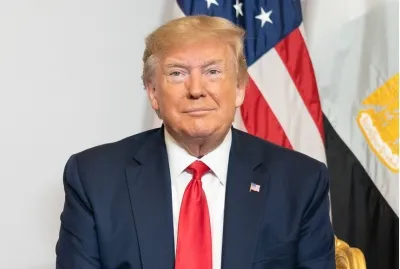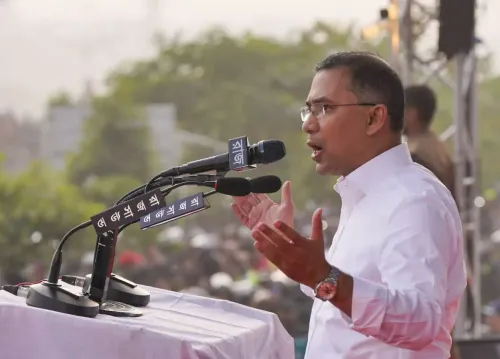What Is The Third Eye: Trump’s Strategy to Keep America as an Economic Superpower?

Synopsis
Key Takeaways
- Shift from interventionism: Trump's policies mark a significant departure from previous US foreign interventions.
- Focus on economic partnerships: Emphasizing trade and regional cooperation as means to enhance stability.
- Impact on Middle East relations: Trump's approach aims to redefine US involvement in Middle Eastern conflicts.
- Concerns for India: Rising geopolitical tensions necessitate a reevaluation of India's strategic responses.
- Future of US-China dynamics: Economic collaboration may mitigate military rivalry between the two nations.
New Delhi, Nov 9 (NationPress) In his second term, US President Donald Trump has signaled a significant shift in strategy, moving away from the US policy of ‘regime change’ and ‘nation building’ aimed at enforcing American governance on other nations. His primary concern was the exorbitant spending associated with a ‘one size fits all’ approach.
During a visit to Riyadh, Saudi Arabia in May 2025, Trump made a noteworthy declaration that true peace, prosperity, and progress stem from respecting and embracing national traditions rather than rejecting them. He emphasized a departure from the previous administration's interventionist policies, advocating for economic collaboration, regional partnerships, and judicious military action. His vision for Saudi governance was to be achieved ‘the Arabian way’.
Trump stated that the future of the Middle East should be characterized by ‘commerce not chaos’ and criticized the ‘failed’ interventions in Afghanistan and Iraq that were justified under the guise of a ‘war on terror’. He dismissed the arguments made by liberal groups advocating for massive expenditures that yielded little to no results. At the conclusion of Trump's visit to Riyadh, Saudi Arabia pledged an investment exceeding 600 billion dollars in the US. Tulsi Gabbard, Director of National Intelligence, echoed Trump's sentiments at the Bahrein Annual Security Conference on November 1, lamenting the waste of taxpayer resources due to past US interventions that ‘created more enemies than friends’.
The transformation in US policy under Trump includes a rejection of American meddling in foreign affairs, reliance on local stakeholders for stability, and leveraging business opportunities to safeguard both regional and US interests.
The President's focus is unwaveringly on enhancing US economic strength, aiming to rectify the adverse trade balance, reduce spending on DEI (Diversity, Equity, and Inclusivity) initiatives, and limit immigration, all under the ‘America First’ doctrine. This non-interventionist stance has enabled the US to advocate for a ceasefire in the ongoing Israel-Hamas conflict and a temporary halt to Israel's 12-day skirmish with Iran, during which the US had conducted airstrikes on Iranian nuclear sites.
However, Gabbard cautioned in Manama that the ceasefire in Gaza remains precarious, and Iran's nuclear endeavors continue to attract scrutiny from the IAEA. Regarding the conflict between Ukraine and Russia, Trump's attempts to resolve territorial disputes were unmet even after exerting pressure on President Zelensky, though this is unlikely to escalate tensions due to a certain camaraderie between Trump and Putin. Trump's lack of enthusiasm for NATO has also been a contributing factor.
Trump is aware that China is advancing economically to establish itself as a superpower, utilizing its Belt & Road Initiative (BRI) as a strategic tool for influence and developing technology to gain a competitive edge globally. The ideological and strategic partnership between China and Russia appears unbreakable, positioning China as the leading partner in their alliance. Trump's rapport with President Putin has contributed to maintaining a peaceful dynamic between the two superpower factions.
The recent one-on-one meeting between Trump and President Xi Jinping in South Korea on October 30 led to a significant economic agreement that outlines future directions for both nations. Both leaders expressed satisfaction with the results, with Xi asserting that the US and China should be ‘partners and friends’. China has lifted restrictions on exporting rare earth minerals to the US, opened its market to American soybeans and other agricultural products, and removed barriers for US semiconductor manufacturers. In return, the US has lowered tariffs on Chinese goods by 10%, reducing them to 47%, while China has temporarily suspended some retaliatory tariffs for a year.
Both nations seem to view economic competition as a preferable alternative to military conflict. The START treaty with Russia remains in effect until next year, and Trump's comments about resuming nuclear testing, should other nations fail to comply, might be more of a posturing tactic than a genuine threat. Nevertheless, Trump's assertion that China and Pakistan are also conducting nuclear tests raises significant concerns for India, given the historical antagonism between these neighboring countries.
In this complex geopolitical landscape, where the US, Russia, and China navigate their interactions, India must carve out its own path. With Trump's apparent inclination towards Pakistan, the Sino-Pak strategic alliance has become a pressing concern for India's national security, especially following the recent military support from China to Pakistan amidst escalating tensions with India.
India has actively engaged in BRICS and Quad initiatives to assert its national interests and even participated in the SCO summit in Tianjin, China, on August 31, signaling its status as a major global player that does not seek rigid alliances but evaluates bilateral relations on their own merits. Defence Minister Rajnath Singh, addressing the ASEAN Defence Ministers Meet in Kuala Lumpur on November 1, firmly stated that the vast maritime region of the Indo-Pacific must remain ‘free of coercion’ and adhere to a ‘rules-based international order’. This statement comes at a time when China is actively attempting to expand its influence in the area by establishing military bases. India appears to regard its Indo-Pacific policy as a counterbalance to China's ambitions in the Indian Ocean.
The Middle East and the Pak-Afghan region are emerging areas of concern for India. The reemergence of Cold War dynamics and Pakistan's efforts to maintain influence in Afghanistan demand India's vigilant attention.
The ongoing hostility between Israel and Iran, alongside Iran's alliance with the Sunni militant group Hamas, exacerbates the conflict between Islam and Zionism. The growing alignment of China and Russia with Iran, in light of the unwavering support of the US for Israel, raises the specter of a renewed Cold War and poses a threat to India's internal security, given its susceptibility to faith-based conflicts.
Pakistan, with its history of mediating with the Taliban post-Soviet withdrawal from Afghanistan and its participation in Doha talks, aims to secure a ‘strategic depth’ in Afghanistan against India.
This region could potentially be exploited for cross-border terrorism directed at India, particularly in Kashmir and beyond. The recent shift of Pakistan towards the Pentagon has created a rift between Islamabad and the Taliban, which historically harbors animosity towards the US. The attacks by the Tahrir Taliban Pakistan (TTP) on Pakistani security forces must be viewed in this context.
India has adeptly cultivated relations with the Taliban government in Kabul, having extended diplomatic honors to the Afghan Foreign Minister during his visit to Delhi in October 2025 - a visit that included a trip to Darul Uloom Deoband, the birthplace of radical Sunni ideology. The visiting dignitary, Amir Khan Muttaqi, assured India that Afghan soil would not be used for any anti-India operations. However, with the resurgence of attacks by Baluch rebels on Pakistani forces, hostility from Pakistan towards India is escalating, necessitating a robust response from India.
While Pakistan aligns itself with the US, it simultaneously facilitates the expansion of the China-Pakistan Economic Corridor (CPEC) and seeks to rekindle strategic relationships with Bangladesh. A convergence of geopolitical factors is prompting Pakistan to adopt a confrontational stance towards India, compelling India to remain vigilant against its neighbor's hostile intentions.
(The writer is a former Director of the Intelligence Bureau)
dcpathak/rs










